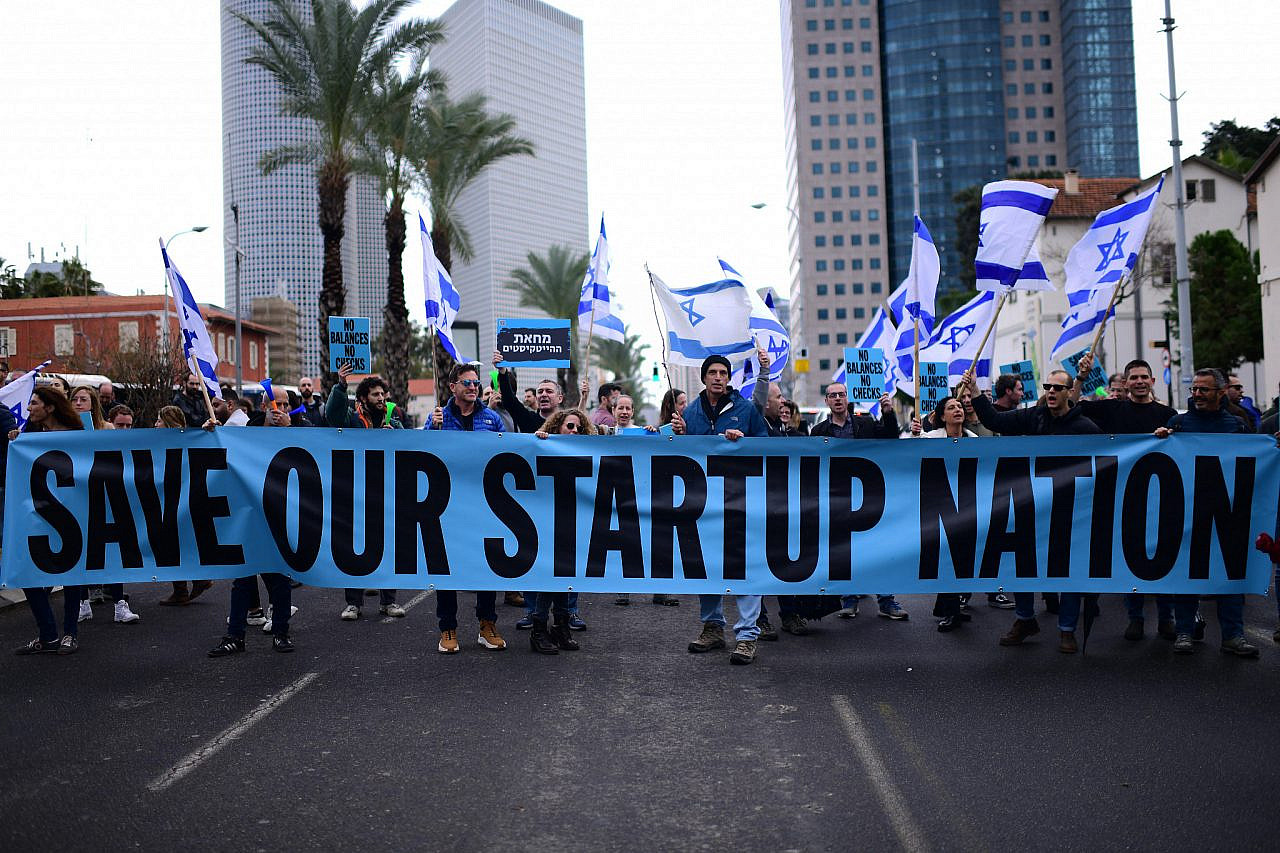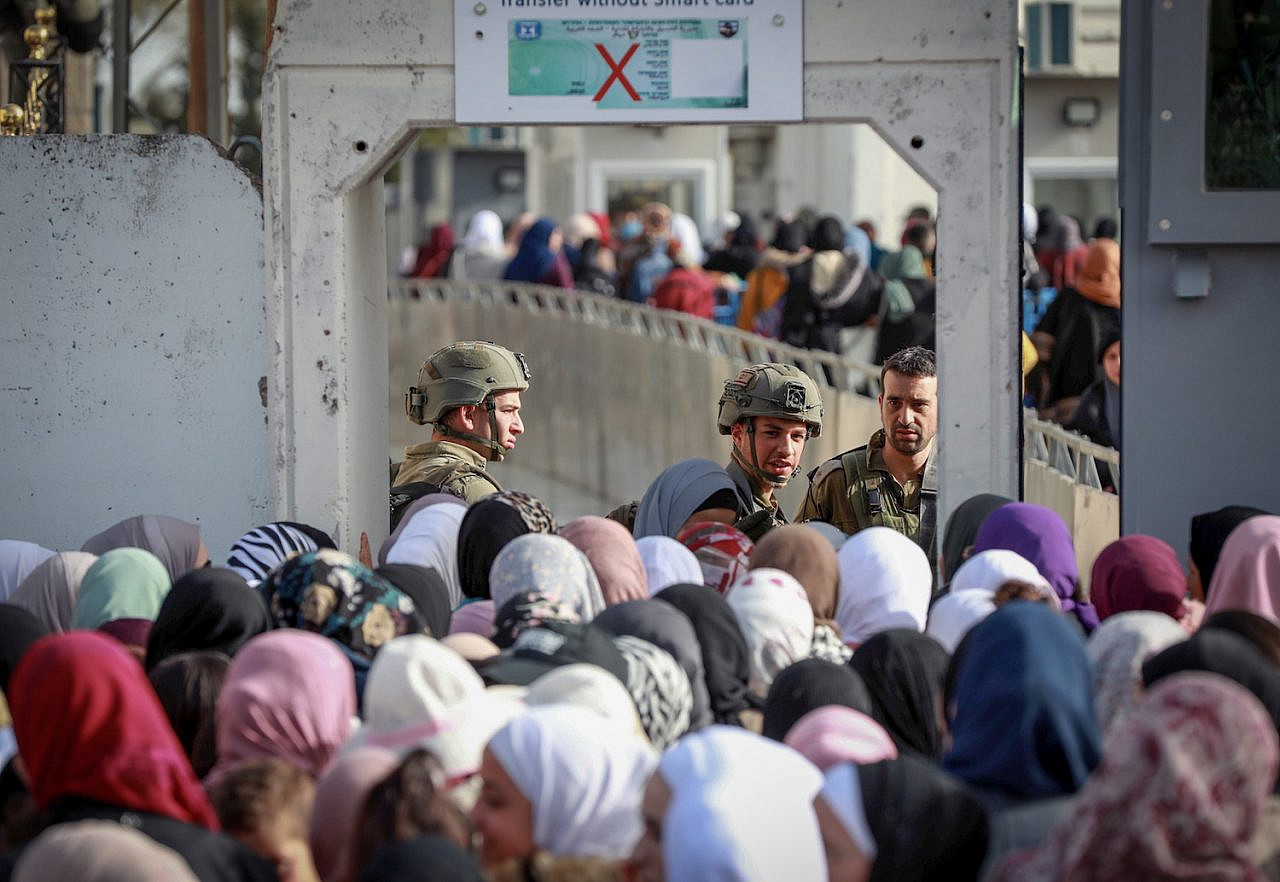Israel’s hitherto successful combination of neoliberalism and apartheid is finally hitting an internal wall.
After months of protests and economic pressure, Prime Minister Benjamin Netanyahu announced on Monday that he was temporarily halting the next phase of his judicial overhaul. The announcement came a night after hundreds of thousands of Israelis took to the streets across the country, following Netanyahu’s dismissal of Defense Minister Yoav Gallant, and after a joint action by big business and the Histadrut, Israel’s largest union — which had been reluctant to join the protest against the legal overhaul — on Monday morning.
This crisis is the culmination of several months of economic warfare waged by large swaths of Israeli society, and especially its elites, against the government. And this internal clash is exposing a surprising weakness in the otherwise booming, tech-led Israeli economy. Now, the question remains: could this weakness also signal an opening in the struggle against the occupation and apartheid?
In all his years as Israel’s prime minister, Benjamin Netanyahu’s most significant achievement has been to make the occupation appear painless, or at least costless. Under his reign, the Israeli economy boomed, in large part thanks to its flourishing high-tech sector. The state improved and expanded its diplomatic relations – opening new markets for the export of software and cybersecurity, developing security ties with regional partners, and making its military technology indispensable for many countries around the world.
The Israeli economic model since the early 2000s has been characterized by economic historian Arie Krampf as isolationist neoliberalism. This is Netanyahu’s project: an export-oriented economy that is supposed to build geopolitical resilience through a strategy of diversified commerce, a low debt-to-GDP ratio, and large foreign currency reserves. This model also requires aggressive deregulation and cuts to social spending, leading to staggering inequality and deepening poverty. The welfare system crumbled, but foreign investment rose; Israel’s new riches were not divided equally, but the economic elite was content.

Through this model, Israel could diversify its risks and economic interests around the world and somewhat decrease its dependency on the U.S. Netanyahu’s relationships with world leaders such as Vladimir Putin and Narendra Modi were based not only on his fondness for like-minded aggressive nationalists, but on a strategy of rebalancing Israel’s position in the global sphere, making it a coveted trading and military partner.
While the international campaign for Palestinian liberation has had an impact on global public opinion, it has been unable to pose a real challenge to this economic model. The BDS movement has largely failed to raise the economic and diplomatic cost on Israel’s government and population for sustaining and entrenching the occupation, and has instead become a lightning rod for the delegitimization of pro-Palestinian voices by well-funded hasbara organizations.
The Palestinian Authority, for its part, has not promoted economic measures against Israel because of the West Bank’s dependency on the Israeli economy and the chokehold of Israel’s military occupation. So while Israeli governments have been moving rightward for decades, deepening the occupation and solidifying an apartheid regime, the state was not being economically harmed, and its diplomatic position only strengthened.
Most read on +972
Ironically, what the BDS campaign has thus far failed to achieve is now being advanced by Jewish Israelis: the elites who are rapidly being radicalized in their clash against the Israeli government’s attempted legal overhaul. The inevitable economic impacts of the overhaul threaten the isolationist neoliberal model, which has long been based on a strong export industry and international impunity. Netanyahu successfully inoculated Israel’s economy against outside pressures, but even he is unable to deal with the current internal strife.
Real dangers
Last Tuesday, Shira Greenberg, the chief economist in Israel’s Finance Ministry, published a report suggesting that if the legal reform is passed in its entirety, Israel’s GDP could decrease by up to NIS 270 billion over the next five years. Other estimates by officials in the same ministry, presented to Finance Minister Bezalel Smotrich earlier this week, suggested a NIS 100 billion annual loss. Smotrich tried to obfuscate by saying that both opportunities and risks were presented in the meeting, but sources in the ministry contradicted him, telling Calcalist: “It’s unclear which opportunities the minister is talking about. There was agreement within the room that these initiatives could cause severe harm to the Israeli economy.”

International financial institutions have been sounding alarm bells about the proposed reform for months. Credit rating agency Moody’s warned that the overhaul may prevent Israel’s credit rating from rising, indicating that the planned changes “could also pose longer-term risks for Israel’s economic prospects, particularly capital inflows into the important high-tech sector.” The Economist, the world’s leading economic newspaper and a barometer for the positions of the global business elite, recently ran a cover story titled: “Will Bibi Break Israel?” There is an emerging international consensus that the new government could significantly alter the trajectory of Israeli capitalism.
The underlying assumption of Israel’s Finance Ministry, Moody’s, and The Economist is that non-democratic states are bad for business. This, however, is a liberal myth: many non-democratic countries are huge business hubs. The best examples are Israel’s new allies in the Gulf; in many respects, authoritarianism can serve capitalism well.
Moreover, Israel itself cannot presently be defined as a democracy as it holds millions under military control while denying them basic rights. But investors never showed that they had a real problem with the occupation. The expected economic downturn, then, will not be a simple reaction to the shrinking democratic space in Israel, but rather the result of a deep internal social struggle within Israel that projects economic risk to outside observers.

The panic dynamic in recent months is a self-fulfilling prophecy. Many among the Israeli elite are in combat mode, and leading them is the high-tech sector. Tech workers, from managers and employees to investors, are deeply involved in the protests against the government. They speak about the end of Israeli democracy and are willing to go to great lengths to stop the government’s plans.
At the same time, they are hedging their personal risks by considering migration destinations or moving their money abroad. Recent reports suggest an exodus of high-tech companies to Greece, Cyprus, or Albania, where 80 Israeli tech companies held a meeting last week examining a potential move. Wealthy high-tech workers are buying properties in Portugal, fearing the reform will go through. These internal preparations project a message to the international financial system that the crisis is real and that Israel is not a safe bet.
Capitalist investors do not necessarily need democracy. They need stability and predictability — commodities that, in Israel, are currently in very short supply.
It’s also the occupation
The planned legal overhaul is part of a broader shift to extreme right-wing dominance in Israeli politics. Among other things, the reform is designed to legalize annexation of the West Bank and enable the further persecution of Palestinian citizens, as well as Israeli leftists. A more calculated political strategy for Netanyahu’s government would have been to cool down the Palestinian issue as much as possible while advancing the legal plan. By decoupling issues of “internal” Israeli democracy from the Palestinian issue, perhaps it would have been easier to fend off the protest movement and international pressure.
But members of Netanyahu’s coalition refuse to decouple these issues — they are making clear that their primary concern in advancing the reform is to punish Palestinians more brutally, bemoaning that the Supreme Court makes it too difficult to demolish homes or deport Palestinians. The racist rhetoric that is uttered every day by government ministers, the intensification of state violence in the West Bank that has killed some 80 Palestinians since the beginning of the year, and the settler pogrom in Huwara that was praised by government ministers all signal that this is a government of fanatics, determined to set fire to the region. This, in turn, diminishes Netanyahu’s own reputation as an effective business-oriented neoliberal leader. He is not in control, and the destabilizing forces on all fronts — economic, social, and military — seem unstoppable.

It appears that the internal protests and international pressure have succeeded in freezing, if only temporarily, the wave of judicial overhaul legislation. According to many economic analysts, though, much of the damage is already done. The instability of recent months and the government’s extremism have already scared away many investors and deemed the Israeli economy risky. Even if the reform is halted, Israel is on course for a significant economic downturn.
In practice, we are seeing the fracturing of the hegemonic alliance between Netanyahu-style neoliberalism and the Israeli capital. For years, Netanyahu’s project of isolationist neoliberalism has been based on Israel being too good an investment to miss. Israel’s economic and strategic might was supposed to counter the international consensus against the settlements and in favor of a two-state solution. The global capital that allowed the Israeli economy to thrive was, therefore, a core element in the diplomatic struggle against the Palestinian cause – and for a long time, it succeeded.
If the economy were to go through a severe downturn, then this could have repercussions for Israeli apartheid. As social and economic chaos ensues, we may well be seeing the first cracks forming in Israel’s impunity on the world stage.




